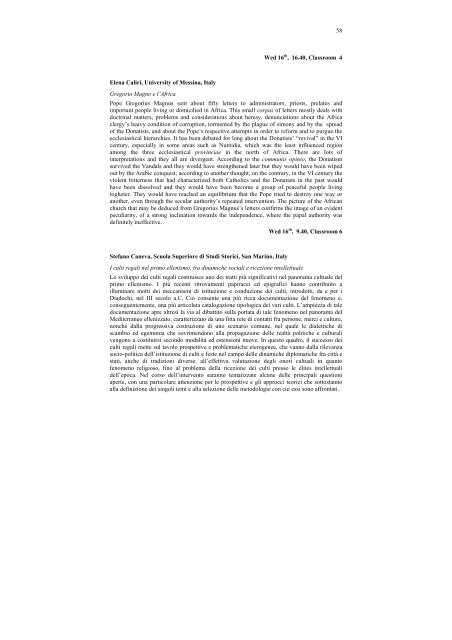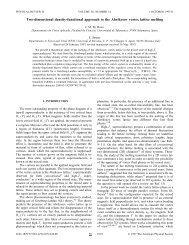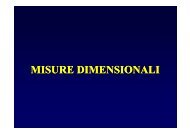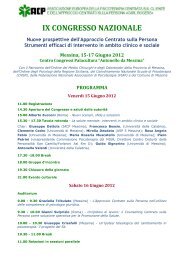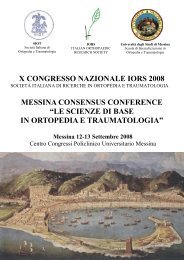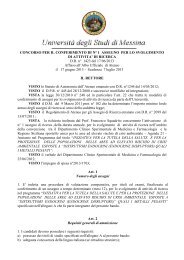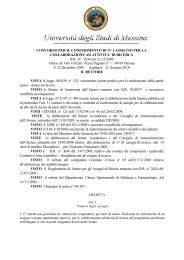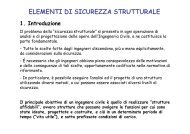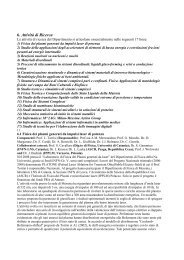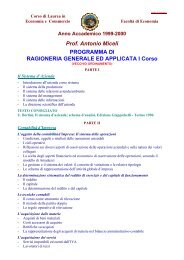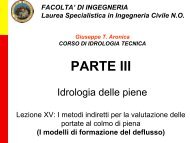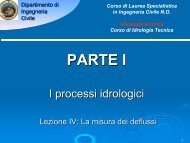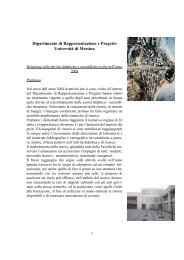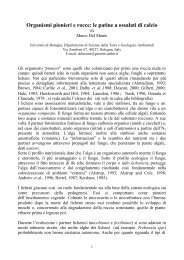PROGRAMME AND ABSTRACTS - Università degli Studi di Messina
PROGRAMME AND ABSTRACTS - Università degli Studi di Messina
PROGRAMME AND ABSTRACTS - Università degli Studi di Messina
Create successful ePaper yourself
Turn your PDF publications into a flip-book with our unique Google optimized e-Paper software.
Elena Caliri, University of <strong>Messina</strong>, Italy<br />
Gregorio Magno e l’Africa<br />
58<br />
Wed 16 th , 16.40, Classroom 4<br />
Pope Gregorius Magnus sent about fifty letters to administrators, priests, prelates and<br />
important people living or domicilied in Africa. This small corpus of letters mostly deals with<br />
doctrinal matters, problems and considerations about heresy, denunciations about the Africa<br />
clergy’s heavy con<strong>di</strong>tion of corruption, tormented by the plague of simony and by the spread<br />
of the Donatists, and about the Pope’s respective attempts in order to reform and to purgue the<br />
ecclesiastical hierarchies. It has been debated for long about the Donatists’ “revival” in the VI<br />
century, especially in some areas such as Numi<strong>di</strong>a, which was the least influenced region<br />
among the three ecclesiastical provinciae in the north of Africa. There are lots of<br />
interpretations and they all are <strong>di</strong>vergent. Accor<strong>di</strong>ng to the communis opinio, the Donatism<br />
survived the Vandals and they would have strengthened later but they would have been wiped<br />
out by the Arabic conquest; accor<strong>di</strong>ng to another thought, on the contrary, in the VI century the<br />
violent bitterness that had characterized both Catholics and the Donatists in the past would<br />
have been <strong>di</strong>ssolved and they would have been become a group of peaceful people living<br />
togheter. They would have reached an equilibrium that the Pope tried to destroy one way or<br />
another, even through the secular authority’s repeated intervention. The picture of the African<br />
church that may be deduced from Gregorius Magnus’s letters confirms the image of an evident<br />
peculiarity, of a strong inclination towards the independence, where the papal authority was<br />
definitely ineffective.<br />
Stefano Caneva, Scuola Superiore <strong>di</strong> <strong>Stu<strong>di</strong></strong> Storici, San Marino, Italy<br />
I culti regali nel primo ellenismo, fra <strong>di</strong>namiche sociali e ricezione intellettuale<br />
Wed 16 th , 9.40, Classroom 6<br />
Lo sviluppo dei culti regali costituisce uno dei tratti più significativi nel panorama cultuale del<br />
primo ellenismo. I più recenti ritrovamenti papiracei ed epigrafici hanno contribuito a<br />
illuminare molti dei meccanismi <strong>di</strong> istituzione e conduzione dei culti, introdotti, da e per i<br />
Diadochi, nel III secolo a.C. Ciò consente una più ricca documentazione del fenomeno e,<br />
conseguentemente, una più articolata catalogazione tipologica dei vari culti. L’ampiezza <strong>di</strong> tale<br />
documentazione apre altresì la via al <strong>di</strong>battito sulla portata <strong>di</strong> tale fenomeno nel panorama del<br />
Me<strong>di</strong>terraneo ellenizzato, caratterizzato da una fitta rete <strong>di</strong> contatti fra persone, merci e culture,<br />
nonché dalla progressiva costruzione <strong>di</strong> uno scenario comune, nel quale le <strong>di</strong>alettiche <strong>di</strong><br />
scambio ed egemonia che sovrintendono alla propagazione delle realtà politiche e culturali<br />
vengono a costituirsi secondo modalità ed estensioni nuove. In questo quadro, il successo dei<br />
culti regali mette sul tavolo prospettive e problematiche eterogenee, che vanno dalla rilevanza<br />
socio-politica dell’istituzione <strong>di</strong> culti e feste nel campo delle <strong>di</strong>namiche <strong>di</strong>plomatiche fra città e<br />
stati, anche <strong>di</strong> tra<strong>di</strong>zioni <strong>di</strong>verse, all’effettiva valutazione <strong>degli</strong> onori cultuali in quanto<br />
fenomeno religioso, fino al problema della ricezione dei culti presso le élites intellettuali<br />
dell’epoca. Nel corso dell’intervento saranno tematizzate alcune delle principali questioni<br />
aperte, con una particolare attenzione per le prospettive e gli approcci teorici che sottostanno<br />
alla definizione dei singoli temi e alla selezione delle metodologie con cui essi sono affrontati.


